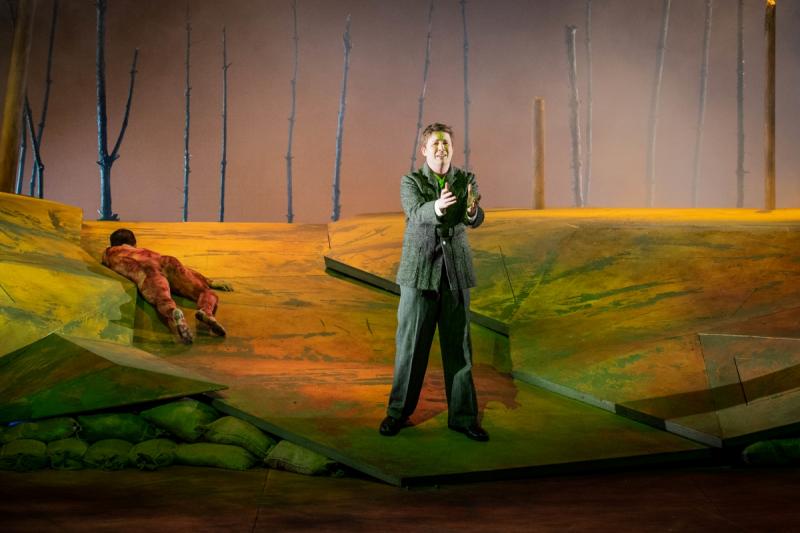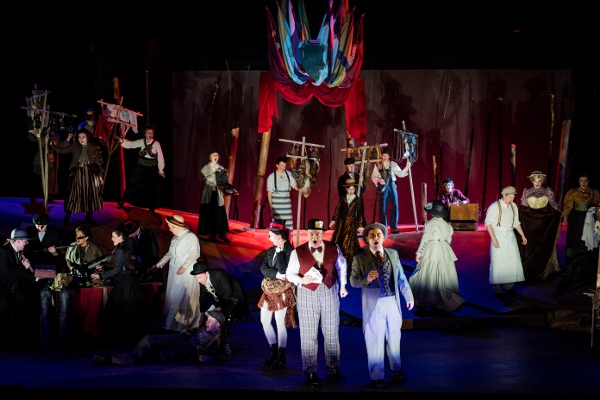The Pilgrim’s Progress, RNCM, Manchester review – a theatrical triumph | reviews, news & interviews
The Pilgrim’s Progress, RNCM, Manchester review – a theatrical triumph
The Pilgrim’s Progress, RNCM, Manchester review – a theatrical triumph
Re-imagining Bunyan’s story as a parable of the First World War

The Royal Northern College of Music’s spring opera is a theatrical triumph and musically very, very good. It’s 27 years since they last presented what Vaughan Williams called his "morality" – that was a triumph too, and they made a CD of it which I still have. They may not be issuing a sound recording this time, but as an experience in the theatre, it is even more compelling.
The quality of the solo performances and of the choral singing is extraordinary. The RNCM clearly has some outstanding young men studying in its vocal faculty these days, and had the opportunity to cast from strength. In Jonathan Cocker’s production, the story is transformed into one of a young man’s shell-shocked trauma in the First World War, and how he struggles against his demons and the less moral society that sent him there. The House Beautiful and the Delectable Mountains are a medical facility and a field hospital, and the angels are the nurses, the medics and honest countryfolk.
Surprising? It fits perfectly with what we might guess to be Vaughan Williams’ own experience, serving as a medic himself after volunteering, on the cusp of middle age, for the trenches. These are scenes and images, no doubt, he knew well. And, though the opera was not completed until after the Second World War, we should remember that he worked on it long before that, and in 1939, the Great War’s ending in the Treaty of Versailles (now a century ago) was a memory of just a little over 20 years past.
 The text itself – following Bunyan – invites the listener to heed the author’s dream and "If thou canst, interpret it …" So what was written as an allegory of a Christian life works wonderfully as an allegory of a soldier’s. "Who would true valour see ...", indeed. The interpretation is carried through with inspiration and imagination in Bob Bailey’s set and costume design and Ian Sommerville’s lighting. A dug-out in the trenches, shell-stripped tree trunks in the background, becomes the country through which the soldier is led, with the fearful, the dead and the vainglorious emerging from its recesses. The only problem the single-set poses is that Williams wrote a fair bit of music to serve as interludes while scenes were changed, but Cocker has overcome this with stage business to continue or introduce the events portrayed – and he (with Bethan Rhys Wiliam in charge of movement) has persuaded all the performers to act their roles with ease and confidence.
The text itself – following Bunyan – invites the listener to heed the author’s dream and "If thou canst, interpret it …" So what was written as an allegory of a Christian life works wonderfully as an allegory of a soldier’s. "Who would true valour see ...", indeed. The interpretation is carried through with inspiration and imagination in Bob Bailey’s set and costume design and Ian Sommerville’s lighting. A dug-out in the trenches, shell-stripped tree trunks in the background, becomes the country through which the soldier is led, with the fearful, the dead and the vainglorious emerging from its recesses. The only problem the single-set poses is that Williams wrote a fair bit of music to serve as interludes while scenes were changed, but Cocker has overcome this with stage business to continue or introduce the events portrayed – and he (with Bethan Rhys Wiliam in charge of movement) has persuaded all the performers to act their roles with ease and confidence.
Bailey’s costume design is social commentary in itself – not just the nursing garb for the "Shining Ones" and so on, but the pre-war dress of the worldly as seen in Vanity Fair (pictured above right) and the wealthy who, under the showy banners of patriotism, sent innocents away to die; and I liked the Williams-like tweed suit given to Pilgrim, once on the road to salvation, as his "armour".
David Parry has the dynamic and inspiring pair of hands holding the baton. The choral singing is magnificent (he’s been well served by chorus master Kevin Thraves), and the score has drama as well as its moments of serenity: the postlude to the Vanity Fair scene was one where the orchestra, despite occasional roughness elsewhere, rose to considerable heights of beauty.
The RNCM had little need to duplicate its casting in this work, except for a few principal roles, as there are so many different chances for individuals to shine. I saw baritone Edward Robinson in the title role and have nothing but praise for his performance, and likewise with Liam McNally’s appearance as the writer in the prologue and epilogue. William Kyle was powerful as the Herald (here a Mr Mayor back home); Kamil Bien impressed with a mature tenor timbre in his roles as Interpreter (in this case a medic) and Messenger in the wartime hospital scenes; Steffan Owen stood out for his singing and his characterization as Lord Hate-Good (now, with the text as cue, a be-wigged and merciless judge).
There were excellent performances, too, from Stephanie Poropat, Lucy Vallis and Rhiannon Doogan as the Shining Ones, Stephanie Maitland as Madam By-Ends (with Ryan Davies as Mr), and a whole variety of roles in Vanity Fair. What an enviable reservoir of talent the RNCM has to draw upon!
- Further performances on Friday (7.30pm) and Saturday (3pm)
rating
Explore topics
Share this article
Add comment
The future of Arts Journalism
You can stop theartsdesk.com closing!
We urgently need financing to survive. Our fundraising drive has thus far raised £49,000 but we need to reach £100,000 or we will be forced to close. Please contribute here: https://gofund.me/c3f6033d
And if you can forward this information to anyone who might assist, we’d be grateful.

Subscribe to theartsdesk.com
Thank you for continuing to read our work on theartsdesk.com. For unlimited access to every article in its entirety, including our archive of more than 15,000 pieces, we're asking for £5 per month or £40 per year. We feel it's a very good deal, and hope you do too.
To take a subscription now simply click here.
And if you're looking for that extra gift for a friend or family member, why not treat them to a theartsdesk.com gift subscription?
more Opera
 Hamlet, Buxton International Festival review - how to re-imagine re-imagined Shakespeare
Music comes first in very 19th century, very Romantic, very French operatic creation
Hamlet, Buxton International Festival review - how to re-imagine re-imagined Shakespeare
Music comes first in very 19th century, very Romantic, very French operatic creation
 Falstaff, Glyndebourne review - knockabout and nostalgia in postwar Windsor
A fat knight to remember, and snappy stagecraft, overcome some tedious waits
Falstaff, Glyndebourne review - knockabout and nostalgia in postwar Windsor
A fat knight to remember, and snappy stagecraft, overcome some tedious waits
 Salome, LSO, Pappano, Barbican review - a partnership in a million
Asmik Grigorian is vocal perfection in league with a great conductor and orchestra
Salome, LSO, Pappano, Barbican review - a partnership in a million
Asmik Grigorian is vocal perfection in league with a great conductor and orchestra
 Semele, Royal Opera review - unholy smoke
Style comes and goes in a justifiably dark treatment of Handelian myth
Semele, Royal Opera review - unholy smoke
Style comes and goes in a justifiably dark treatment of Handelian myth
 Le nozze di Figaro, Glyndebourne review - perceptive humanity in period setting
Mostly glorious cast, sharp ideas, fussy conducting
Le nozze di Figaro, Glyndebourne review - perceptive humanity in period setting
Mostly glorious cast, sharp ideas, fussy conducting
 Fidelio, Garsington Opera review - a battle of sunshine and shadows
Intimacy yields to spectacle as Beethoven's light of freedom triumphs
Fidelio, Garsington Opera review - a battle of sunshine and shadows
Intimacy yields to spectacle as Beethoven's light of freedom triumphs
 Dangerous Matter, RNCM, Manchester review - opera meets science in an 18th century tale
Big doses of history and didaction are injected into 50 minutes of music theatre
Dangerous Matter, RNCM, Manchester review - opera meets science in an 18th century tale
Big doses of history and didaction are injected into 50 minutes of music theatre
 Mazeppa, Grange Park Opera review - a gripping reassessment
Unbalanced drama with a powerful core, uninhibitedly staged
Mazeppa, Grange Park Opera review - a gripping reassessment
Unbalanced drama with a powerful core, uninhibitedly staged
 Saul, Glyndebourne review - playful, visually ravishing descent into darkness
Ten years after it first opened Barrie Kosky's production still packs a hefty punch
Saul, Glyndebourne review - playful, visually ravishing descent into darkness
Ten years after it first opened Barrie Kosky's production still packs a hefty punch
 Così fan tutte, Nevill Holt Festival/Opera North review - re-writing the script
Real feeling turns the tables on stage artifice in Mozart that charms, and moves
Così fan tutte, Nevill Holt Festival/Opera North review - re-writing the script
Real feeling turns the tables on stage artifice in Mozart that charms, and moves
 La Straniera, Chelsea Opera Group, Barlow, Cadogan Hall review - diva power saves minor Bellini
Australian soprano Helena Dix is honoured by fine fellow singers, but not her conductor
La Straniera, Chelsea Opera Group, Barlow, Cadogan Hall review - diva power saves minor Bellini
Australian soprano Helena Dix is honoured by fine fellow singers, but not her conductor
 The Queen of Spades, Garsington Opera review - sonorous gliding over a heart of darkness
Striking design and clear concept, but the intensity within comes and goes
The Queen of Spades, Garsington Opera review - sonorous gliding over a heart of darkness
Striking design and clear concept, but the intensity within comes and goes

Comments
Everything about this